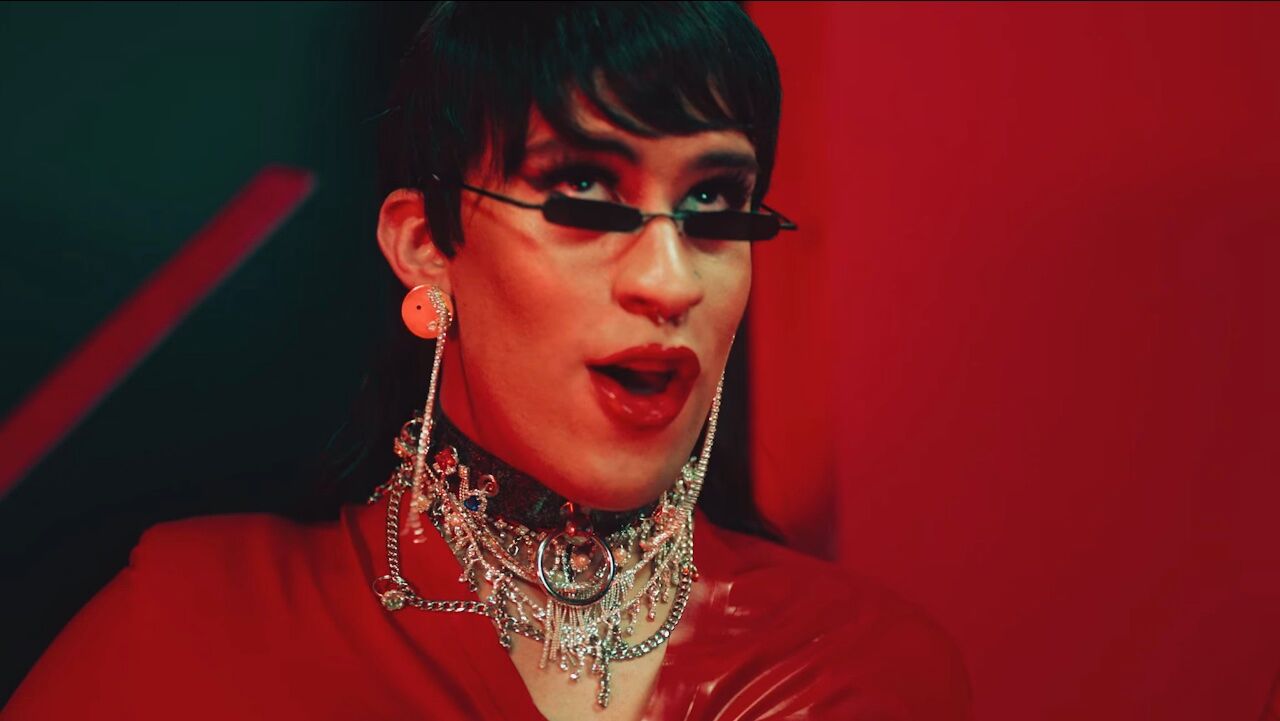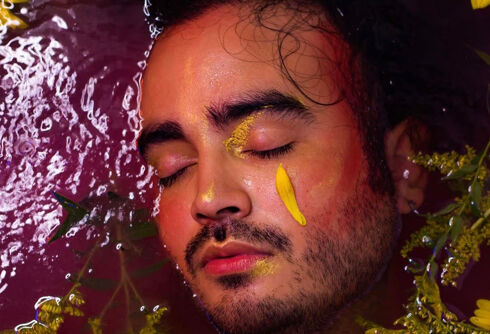After the album Un Verano Sin Ti (A Summer Without You) debuted in the top position of the Billboard charts in May 2022, rapper Bad Bunny’s queer-adjacent performances and flawless style made almost as many headlines as his provocative lyrics and infectious rhythms.
At the MTV Video Music Awards that August, he kissed one of his male backup dancers at the end of “Tití Me Preguntó” (“Auntie Asked Me”), a boast-driven floorburner about hooking up. He made music history when Un Verano Sin Ti became the first Spanish-language record to receive a Grammy nomination for Album of the Year. His bomba-infused opening number, “El Apagon” (“The Blackout”) – filled with conga drums, Latin brass, and giant papier-mâche heads – had the Grammy crowd dancing in the aisles.
Related:
Keep an eye on these 5 LGBTQ+ Latinx candidates running for office this year
These game-changers reveal their big plans for progressive community justice.
He turned heads again last May when he showed up at the Met Gala wearing a white double-breasted suit – backless, as if it were an evening gown – with a 20-foot-long train of white flowers draped around his shoulders.
Never Miss a Beat
Subscribe to our newsletter to stay ahead of the latest LGBTQ+ political news and insights.
His activism is as vibrant as his music. He’s an “irrepressible global pop star and political provocateur,” according to NPR reporter Isabelia Herrera. In interviews, he loudly denounces public corruption in Puerto Rico. (How many people at the Grammys knew they were boogying to a piece about rolling blackouts caused by the privatization of the power grid?) His songs call out toxic machismo as easily as they celebrate getting laid. Through it all, he gently but firmly refuses to sing in English.
So who is Bad Bunny?
“Yo soy Benito Antonio Martínez Acasio,” he roared at the VMAs while accepting the award for Artist of the Year, “de Puerto Rico para el mundo entero!” (“I am Benito Antonio Martínez Acasio, from Puerto Rico to the whole world!”) To the tens of thousands of Latinx fans who’ve filled his packed sold-out shows in Los Angeles and New York City for The World’s Hottest Tour in late 2022, he is simply “Benito!”
This past year has been El Año Con Benito, and we’ve all just been living in it.
Born in the mid-90s, Bad Bunny grew up in a lower-middle-class barrio near the small city of Vega Baja, on the north-central coast of Puerto Rico. His geographic and economic roots form a key part of his musical and political identity.
While his parents listened to more mainstream music like salsa, merengue, and Latin pop, young Benito was drawn to reggaetón artists like Daddy Yankee, whose 2004 song “Gasolina” had become a global pop hit. Reggaetón borrows rhythms from Jamaican dancehall while remixing rap and hip hop with slick production and Latin beats. Evoking an impressive range of Latin American and Caribbean musical styles, Un Verano Sin Ti pays tribute to these early influences.
Bad Bunny, the artist, was born in the mid-2010s. While working his way through college bagging groceries, Benito began uploading Latin trap music to SoundCloud. Although similar to reggaetón, Latin trap draws its swagger and style more directly from Southern hip-hop. The name “Bad Bunny” came from a picture that he had shared on social media of his unhappy younger self wearing a rabbit costume.
His ascent to the “King of Latin Trap” has been swift. In 2016, A DJ/producer from San Juan offered him a recording contract. A remix of his song “Soy Peor” (“I’m Worse”) first landed Bad Bunny on Billboard’s Hot Latin Songs chart in 2017. Less than a year later, he collaborated with reggaetón artist J Balvin on rapper Cardi B’s mega-hit “I Like It.”
Music critic Gary Suarez, writing for Vulture, declared that the song not only introduced musical forms like Latin trap to mainstream American audiences, but that it “made Bad Bunny a household name.”
Suarez isn’t wrong. Bad Bunny currently holds the record for most singles appearing on Billboard’s Hot Latin Songs chart (149), with 63 of them landing in the Top 10. Twelve have reached Number 1. He’s been named Artist of the Year four times at the Billboard Latin Music Awards. Although Un Verano Sin Ti didn’t win Album of the Year for 2022, it nabbed Bad Bunny his third Grammy for Best Música Urbana Album in a row. During that same period, he has been the most streamed artist on Spotify.
Bad Bunny’s queer-appeal mixes pop, performance, & politics
Part of Bad Bunny’s political identity manifests in queer-friendly ways through his use of fashion. In videos and at social events, he subverts gender norms by incorporating both masculine and feminine elements in stylish ways. At the end of the video for “Tití Me Preguntó,” he is dressed in a long black skirt as he plays a player forced into marriage at last. An earlier song, “Yo Perreo Sola” (“I Twerk Alone”), features Bad Bunny in a red leather minidress and flawless wig, portraying a sexy woman who really just wants to be left alone to dance by herself at a club.
He is unafraid to show support for LGBTQ+ people and stories. In a 2020 appearance on The Tonight Show, he wore a T-shirt decrying the murder of Alexa Negrón Luciano, a homeless transgender woman. Only a month ago, he shared an on-screen kiss with Gael García Bernal in Cassandro, a film based on the real-life story of Saúl Armendáriz, a gay wrestler known as “The Liberace of Lucha Libre.”
Bad Bunny seems destined to thrive. As Mexican-American music industry executive Ophelia Zuniga observed, it is because he is “deeply rooted.” Rather than just promoting Un Verano Sin Ti, The Hottest Music Tour paid respect to a number of pioneering Latinx musicians. For Zuniga, Bad Bunny’s decision to platform the Puerto Rican “Queen of Reggaetón” Ivy Queen alongside special guests like Cardi B was “a service that [Bad Bunny] did for all of the new generations” of listeners.”
Likewise, his two-hour set headlining Coachella last April was filled with musical guests and featured two “Latin Music 101 interludes” explaining the history of the different styles to the audience.
After the phenomenal success of the past year, Bad Bunny is taking “a year of rest and relaxation” from making music and touring. At the end of a recent Vanity Fair interview, he suggested that he might return to Puerto Rico to visit his family. He sometimes sees himself, as writer Michelle Ruiz suggests, as “a relative who went to work […] on the mainland.”
When he comes home, he’ll be Benito Antonio Martínez Acasio… a pop star who just wants to be himself.















